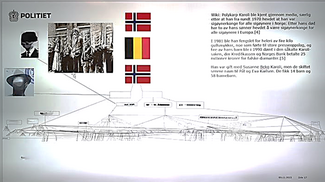Norwegian Police keeping ‘family tree’ to register its Roma citizens

The Norwegian police are keeping a register of its Roma and Traveller citizens – a practice that survived the end of the Nazi rule when the country was liberated at the end of World War 2 – a whistleblower has claimed.
The whistleblower, Professor Solvor Mjøberg Lauritzen, came across the shocking fact when she was shown an example of a ‘family tree’ of Roma and Travellers (known as Romanifolk/tatere in Norway) and photographed it, and then gained more evidence at a follow up police conference.
Speaking to Al Jazeera, Professor Lauritzen, who campaigns for Roma rights, said that the register contained a few known criminals, but then tracked the relatives of those criminals back through a ‘family tree’ which even included Roma children, Holocaust survivors, and people who were dead.
Keeping registers of citizens based on their ethnic and racial background is illegal in Norway.
“A (police) officer showed me the register on his computer and explained how he had created it,” said Professor Lauritzen. “The register includes 14 people facing charges in ongoing criminal cases, 74 who are their close relatives and 567 other people. The register even includes Holocaust survivors, deceased people as well as Roma children.”
The practice survived the end of World War 2 and the liberation of Norway from Nazi rule, says Professor Lauritzen, although a similar method introduced in the 1920s had already made Norway completely Roma-free when the German army occupied Norway in 1940.
“As stateless individuals, many (expelled Norwegian Roma) were unable to secure legal stays in other countries, and they kept getting deported from place to place,” says Professor Lauritzen. “In the 1940s, many of them were rounded up and sent to the Auschwitz-Birkenau concentration camp complex in Nazi-occupied Poland. Of those deported to the camps, only four survived.”
Those four Roma Holocaust survivors then had to fight a legal battle to be allowed to return to Norway and were only allowed back in again in 1956, 11 years after World War 2 had ended.
“The news, of course, received strong reactions from the Norwegian Roma,” said Professor Lauritzen, adding that Roma knew that such practices had led to the Holocaust.
“A Roma child I recently met at a meeting about the register looked at me with serious eyes and asked, “Does the police have my name?””
To read Professor Solvor Mjøberg Lauritzen’s full article, click on this link: The wrongs and harms of a Roma register in Norway
TT News
(Photograph: A photo of a family tree of Roma people in Norway created by the Norwegian police; names and faces have been blurred to protect their identities. Courtesy of Solvor Mjøberg Lauritzen)